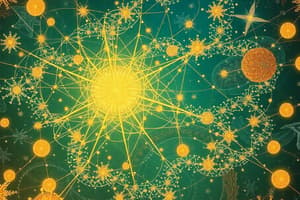Podcast
Questions and Answers
What is Physical Science?
What is Physical Science?
the study of matter and energy
What does Physics study?
What does Physics study?
the study of energy and how it affects matter
What is Technology?
What is Technology?
The application of knowledge, tools, and materials to solve problems and accomplish tasks
What is a Model in science?
What is a Model in science?
What is a Theory?
What is a Theory?
What is a Hypothesis?
What is a Hypothesis?
What is a Meter?
What is a Meter?
What is Mass?
What is Mass?
What is Area?
What is Area?
What is Chemistry?
What is Chemistry?
What is a Scientific Theory?
What is a Scientific Theory?
What is Observation?
What is Observation?
What is a Variable?
What is a Variable?
What is a Law in science?
What is a Law in science?
What is Data?
What is Data?
What is Volume?
What is Volume?
What is Temperature?
What is Temperature?
What is Density?
What is Density?
Flashcards are hidden until you start studying
Study Notes
Key Concepts in Physical Science
- Physical Science: Encompasses the study of matter and energy, crucial for understanding the natural world.
- Physics: Focuses on energy and its effects on matter, integral for exploring fundamental laws of nature.
- Technology: Involves applying knowledge, tools, and materials to develop solutions and perform tasks effectively.
Models and Theories
- Model: Represents an object or system, aiding in visualization and understanding complex concepts.
- Theory: Provides a cohesive explanation for a wide range of hypotheses and empirical observations, validated through testing.
Hypotheses and Experiments
- Hypothesis: Serves as a potential explanation for issues, guiding experimental inquiry.
- Scientific Theory: Outlines a methodological process that scientists utilize to address questions and solve problems systematically.
Measurement and Scientific Concepts
- Meter: The fundamental unit of length in the International System of Units (SI).
- Mass: Defines the amount of matter comprising an object, central to understanding physical properties.
- Area: Quantifies the surface extent of an object, significant in calculating spatial dimensions.
Branches of Science
- Chemistry: Studies various forms of matter and their interactions, critical for understanding chemical processes.
- Observation: Engaging senses to collect information, foundational to scientific inquiry.
Variables and Experimental Design
- Variable: Represents a single differing factor within an experimental setting, essential for analyzing effects.
- Law: A concise summary derived from extensive experimental data, describing general principles guiding natural phenomena.
Data and Measurements
- Data: Includes any information resulting from experiments, forming the basis for scientific analysis.
- Volume: Identifies the space occupied by an object, vital for understanding physical properties and behaviors.
- Temperature: Measures thermal energy, indicating how hot or cold an object is, important in various scientific applications.
- Density: Describes the mass of matter per unit volume, key in identifying material properties and behaviors in different states.
Studying That Suits You
Use AI to generate personalized quizzes and flashcards to suit your learning preferences.




